‘Beau Is Afraid’ Is a Mind-Bending Acid Trip of Epic Proportions

- Oops!Something went wrong.Please try again later.
- Oops!Something went wrong.Please try again later.
- Oops!Something went wrong.Please try again later.
Ari Aster was prematurely dubbed a visionary on the basis of Hereditary and Midsommar, two films that were (to put it kindly) steeped in cinema’s past. Yet he now convincingly earns that moniker with Beau is Afraid, a horror-comedy that’s unlike anything he—or anyone else, for that matter—has produced before.
A wildly surrealistic nightmare of primal and modern neuroses, the writer/director’s third A24 feature spends not a minute of its daunting three-hour runtime retracing others’ steps, instead diving deeply and madly into the mindset of its protagonist (and, by extension, its maker). Challenging in the most thrilling ways possible, it plays like a mind-bending Oedipal acid trip of epic proportions.
Beau is Afraid (in theaters April 14 in New York and Los Angeles, and nationwide on April 21) opens with birth as seen from the perspective of a fetus—an event of screaming recriminations, terror, illumination and violence that serves as the source of every ensuing insanity. Decades later in an unspecified time, place, and reality that loosely resembles today, Beau (Joaquin Phoenix) visits his therapist (Stephen McKinley Henderson) to discuss an upcoming visit to his domineering Jewish tycoon mother Mona (Zoe Lister-Jones in the past; Patti LuPone in the present). The visit appears to be driven by remorse (he hasn’t seen her in months) and fills him with barely suppressed dread.
Beau acts aghast when asked if he ever wished his mother was dead, but he’s not totally convincing. That impression is subsequently reinforced when—following an evening during which he’s kept awake by a neighbor sending notes under his apartment door to lower the volume of his (non-existent) music—he wakes up late, mysteriously loses his keys, and misses his flight, forcing him to make a brutally uncomfortable phone call during which he breaks the news to his bitterly disappointed, guilt-tripping mom.

A middle-aged loner with thinning gray hair, a slight paunch, and a soft, perpetually nervous voice, Beau is an insecure shut-in. He’s barely subsisting in a metropolitan wasteland defined by shabby storefronts, burned cars, corpses in the street, and nude, stabby serial killers roaming about for victims. In response to his latest failure, Beau gives his new anxiety medication a try, only to forget that he must take it with water—which he doesn’t have.
This spurs an excursion outside, which begets chaos and destruction inside his home. His turmoil is then exacerbated when, upon reclaiming control of his apartment, he tries to call his mother back and instead gets a UPS delivery man (a cameoing Bill Hader) who’s stumbled upon a shocking scene: Mona lying dead in her home, her skull smashed to smithereens by a falling chandelier.
Beau is Afraid continues Aster’s fondness for decapitation and cranial destruction, just as it revisits the director’s fascination with children mourning their parents. Yet dissimilar to his prior efforts—whose familial and folk-horror moves were dully borrowed from genre predecessors—the film plots, from the outset, a uniquely bonkers trajectory.
In ‘Showing Up,’ Michelle Williams Brilliantly Taps Into an Artist’s Inner Hell
Its hysterical tone pitched somewhere between Synecdoche, New York; Alice in Wonderland; and a Looney Tunes cartoon, Aster’s saga soon thrusts its main character out of the urban and into the suburban, courtesy of a vehicular accident that lands him in the care of a couple, Grace (Amy Ryan) and Roger (Nathan Lane), who nurse him back to health. That they do this in the K-Pop-decorated bedroom of their resentful daughter Toni (Kylie Rogers) would be strange in any other context; here, however, it’s part and parcel of a story that takes only extreme right turns.
With Roger calling Beau things like “My brutha” and “pal-eo,” and he and Grace simultaneously caring for Jeeves (Denis Ménochet), a rampaging PTSD-afflicted comrade of their deceased Air Force veteran son, the injured Beau finds himself falling further and further down a rabbit hole of loss, grief, sorrow, shame, and lunacy. Throughout, Aster affixes us to the man’s spiraling (and, per the conception intro, fluid-drenched) POV.
Traumatic flashbacks to childhood incidents with his mom, a bathtub, and an attic, as well as a cruise ship romance with teen Elaine (Julia Antonelli)— during which Beau is played by Armen Nahapetian—underscore the origins of this schlub’s twisted Freudian hang-ups. Ultimately, it’s revealed that they’re the byproduct of his mom’s suffocating sexualized clinginess and her story that his father died at the moment of Beau’s conception—a supposed inherited condition that burdens Beau with additional fears of separation from his mom and stunts his maturation and connection to others. (Hence all the moments in which he practically freezes in place.)

Pill-popping, drug-smoking, forest theatrical productions, boat voyages through starry nights and dark caverns, and a battle with a giant cock-and-balls monster ensue, all of them speaking to Beau’s consuming angst. True to its title, Beau is afraid of everything (isolation, disconnection, violation, illness, and death), with Aster casting his odyssey as a swirling descent into countless social and psychosexual worries.
Beau is Afraid is sometimes funny and occasionally unnerving, but mostly, it’s electrifyingly idiosyncratic, never more so than during an extended narration-driven, fairy-tale middle section that concerns a stage show—about a lonely soul who ultimately reunites with his long-lost family—that dreamily echoes Beau’s own plight. Aster dramatizes this interlude with impressionistic animation and concludes it with a gorgeous painterly close-up of the aged Beau—one of many memorable aesthetic flourishes found in this dazzling journey.
Aster’s directorial gifts are imposing, and so too is the lead performance delivered by Phoenix, who embodies Beau as a preternaturally dazed and confused man-child incapable of disentangling himself from his mom. In the aftermath (afterbirth?) of the weirdest sex scene in recent memory between its headliner and Parker Posey and set, fittingly and hilariously, to Mariah Carey’s “Always Be My Baby,” Mona eventually appears in the imperious figure of LuPone, who rages against her offspring’s lifelong disregard for her love and generosity.

In Beau is Afraid’s closing passages, Aster (via Beau) engages in a form of cinematic self-flagellation, putting his hero on bonkers trial for his damnable sins as a son. In doing so, however, he lets no one off the hook; rather, he posits his narrative’s central relationship as thoroughly corrosive on both sides, ruining all.
Eliciting laughs of an astonished sort, the willfully unhinged Beau is Afraid is like a funhouse-mirror plunge into Aster’s psyche, where M.C. Escher, Philip Roth, Grant Wood and The Purge all crazily cohabitate. No matter its many inspirations, though, the auteur’s latest is a true American original, and proof that, while the hype surrounding him may have been early, it wasn’t wrong.
Liked this review? Sign up to get our weekly See Skip newsletter every Tuesday and find out what new shows and movies are worth watching, and which aren’t.
Get the Daily Beast's biggest scoops and scandals delivered right to your inbox. Sign up now.
Stay informed and gain unlimited access to the Daily Beast's unmatched reporting. Subscribe now.

